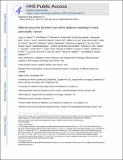| dc.contributor.author | Danai, Laura V. | |
| dc.contributor.author | Dennstedt, Emily A. | |
| dc.contributor.author | Muir, Alexander | |
| dc.contributor.author | Lien, Evan C. | |
| dc.contributor.author | Mayers, Jared R. | |
| dc.contributor.author | Lau, Allison N. | |
| dc.contributor.author | Jones-Sali, Paul | |
| dc.contributor.author | Vander Heiden, Matthew G. | |
| dc.date.accessioned | 2020-04-29T16:19:25Z | |
| dc.date.available | 2020-04-29T16:19:25Z | |
| dc.date.issued | 2018-06 | |
| dc.identifier.issn | 0028-0836 | |
| dc.identifier.issn | 1476-4687 | |
| dc.identifier.uri | https://hdl.handle.net/1721.1/124925 | |
| dc.description.abstract | Changes in cell and organismal metabolism accompany malignancy1,2. Pancreatic ductal adenocarcinoma (PDAC) is associated with peripheral tissue wasting, a metabolic syndrome that lowers quality of life and is proposed to decrease cancer patient survival3,4. Tissue wasting is a multifactorial disease and targeting specific circulating factors to reverse this syndrome has been mostly ineffective in the clinic5,6. Here, we show that both adipose and muscle tissue loss occur early in pancreatic cancer development. Using syngeneic PDAC mouse models, we show that tumor growth in the pancreas but not in other sites leads to adipose tissue wasting, suggesting that tumor growth within the pancreatic environment contributes to this wasting phenotype. We find decreased exocrine pancreatic function drives adipose tissue loss and pancreatic enzyme replacement attenuates PDAC-associated peripheral tissue wasting. Paradoxically, reversal of adipose tissue loss impairs survival in mice with PDAC. Upon analysis of PDAC patients, we find that adipose and skeletal muscle depletion at the time of diagnosis is not associated with worse survival. Taken together, these results provide an explanation for adipose tissue wasting in early PDAC and suggest that early peripheral tissue loss associated with pancreatic cancer may not impair survival. | en_US |
| dc.description.sponsorship | National Institutes of Health (U.S.). Ruth Kirschstein Fellowship (Grant F32CA210421) | en_US |
| dc.description.sponsorship | National Institutes of Health (U.S.). Ruth Kirschstein Fellowship (Grant F32CA213810) | en_US |
| dc.description.sponsorship | Damon Runyon Cancer Research Foundation (Grant DRG-2299-17) | en_US |
| dc.description.sponsorship | Damon Runyon Cancer Research Foundation (Grant DRG-2241-15) | en_US |
| dc.description.sponsorship | United States. Department of Defense (Grant CA130288) | en_US |
| dc.description.sponsorship | National Institutes of Health (U.S.) (Grant R01CA168653) | en_US |
| dc.description.sponsorship | National Institutes of Health (U.S.) (Grant P30CA14051) | en_US |
| dc.language.iso | en | |
| dc.publisher | Springer Science and Business Media LLC | en_US |
| dc.relation.isversionof | 10.1038/s41586-018-0235-7 | en_US |
| dc.rights | Article is made available in accordance with the publisher's policy and may be subject to US copyright law. Please refer to the publisher's site for terms of use. | en_US |
| dc.source | PMC | en_US |
| dc.subject | Multidisciplinary | en_US |
| dc.title | Altered exocrine function can drive adipose wasting in early pancreatic cancer | en_US |
| dc.type | Article | en_US |
| dc.identifier.citation | Danai, Laura V. et al. “Altered exocrine function can drive adipose wasting in early pancreatic cancer.” Nature 558 (2018): 600-604 © 2018 The Author(s) | en_US |
| dc.contributor.department | Massachusetts Institute of Technology. Department of Biology | en_US |
| dc.contributor.department | Koch Institute for Integrative Cancer Research at MIT | en_US |
| dc.relation.journal | Nature | en_US |
| dc.eprint.version | Author's final manuscript | en_US |
| dc.type.uri | http://purl.org/eprint/type/JournalArticle | en_US |
| eprint.status | http://purl.org/eprint/status/PeerReviewed | en_US |
| dc.date.updated | 2020-01-30T18:40:23Z | |
| dspace.date.submission | 2020-01-30T18:40:25Z | |
| mit.journal.volume | 558 | en_US |
| mit.journal.issue | 7711 | en_US |
| mit.license | PUBLISHER_POLICY | |
| mit.metadata.status | Complete | |
